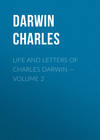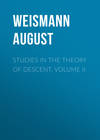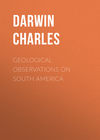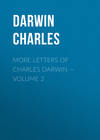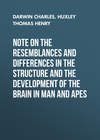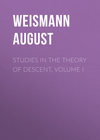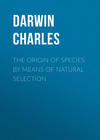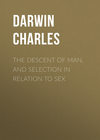Buch lesen: «Life and Letters of Charles Darwin — Volume 2»
TRANSCRIPT OF A FACSIMILE OF A PAGE FROM A NOTE-BOOK OF 1837
— led to comprehend true affinities. My theory would give zest to recent & Fossil Comparative Anatomy: it would lead to study of instincts, heredity, & mind heredity, whole metaphysics, it would lead to closest examination of hybridity & generation, causes of change in order to know what we have come from & to what we tend, to what circumstances favour crossing & what prevents it, this & direct examination of direct passages of structure in species, might lead to laws of change, which would then be main object of study, to guide our speculations.
VOLUME II
CHAPTER 2.I. — THE PUBLICATION OF THE 'ORIGIN OF SPECIES.'
OCTOBER 3, 1859, TO DECEMBER 31, 1859
1859.
[Under the date of October 1st, 1859, in my father's Diary occurs the entry: "Finished proofs (thirteen months and ten days) of Abstract on 'Origin of Species'; 1250 copies printed. The first edition was published on November 24th, and all copies sold first day."
On October 2d he started for a water-cure establishment at Ilkley, near Leeds, where he remained with his family until December, and on the 9th of that month he was again at Down. The only other entry in the Diary for this year is as follows: "During end of November and beginning of December, employed in correcting for second edition of 3000 copies; multitude of letters."
The first and a few of the subsequent letters refer to proof sheets, and to early copies of the 'Origin' which were sent to friends before the book was published.]
C. LYELL TO CHARLES DARWIN. (Part of this letter is given in the 'Life of Sir Charles Lyell,' volume ii. page 325.) October 3d, 1859.
My dear Darwin,
I have just finished your volume and right glad I am that I did my best with Hooker to persuade you to publish it without waiting for a time which probably could never have arrived, though you lived till the age of a hundred, when you had prepared all your facts on which you ground so many grand generalizations.
It is a splendid case of close reasoning, and long substantial argument throughout so many pages; the condensation immense, too great perhaps for the uninitiated, but an effective and important preliminary statement, which will admit, even before your detailed proofs appear, of some occasional useful exemplification, such as your pigeons and cirripedes, of which you make such excellent use.
I mean that, when, as I fully expect, a new edition is soon called for, you may here and there insert an actual case to relieve the vast number of abstract propositions. So far as I am concerned, I am so well prepared to take your statements of facts for granted, that I do not think the "pieces justificatives" when published will make much difference, and I have long seen most clearly that if any concession is made, all that you claim in your concluding pages will follow. It is this which has made me so long hesitate, always feeling that the case of Man and his races, and of other animals, and that of plants is one and the same, and that if a "vera causa" be admitted for one, instead of a purely unknown and imaginary one, such as the word "Creation," all the consequences must follow.
I fear I have not time to-day, as I am just leaving this place, to indulge in a variety of comments, and to say how much I was delighted with Oceanic Islands — Rudimentary Organs — Embryology — the genealogical key to the Natural System, Geographical Distribution, and if I went on I should be copying the heads of all your chapters. But I will say a word of the Recapitulation, in case some slight alteration, or at least, omission of a word or two be still possible in that.
In the first place, at page 480, it cannot surely be said that the most eminent naturalists have rejected the view of the mutability of species? You do not mean to ignore G. St. Hilaire and Lamarck. As to the latter, you may say, that in regard to animals you substitute natural selection for volition to a certain considerable extent, but in his theory of the changes of plants he could not introduce volition; he may, no doubt, have laid an undue comparative stress on changes in physical conditions, and too little on those of contending organisms. He at least was for the universal mutability of species and for a genealogical link between the first and the present. The men of his school also appealed to domesticated varieties. (Do you mean LIVING naturalists?) (In the published copies of the first edition, page 480, the words are "eminent living naturalists.")
The first page of this most important summary gives the adversary an advantage, by putting forth so abruptly and crudely such a startling objection as the formation of "the eye," not by means analogous to man's reason, or rather by some power immeasurably superior to human reason, but by superinduced variation like those of which a cattle-breeder avails himself. Pages would be required thus to state an objection and remove it. It would be better, as you wish to persuade, to say nothing. Leave out several sentences, and in a future edition bring it out more fully. Between the throwing down of such a stumbling-block in the way of the reader, and the passage to the working ants, in page 460, there are pages required; and these ants are a bathos to him before he has recovered from the shock of being called upon to believe the eye to have been brought to perfection, from a state of blindness or purblindness, by such variations as we witness. I think a little omission would greatly lessen the objectionableness of these sentences if you have not time to recast and amplify.
... But these are small matters, mere spots on the sun. Your comparison of the letters retained in words, when no longer wanted for the sound, to rudimentary organs is excellent, as both are truly genealogical.
The want of peculiar birds in Madeira is a greater difficulty than seemed to me allowed for. I could cite passages where you show that variations are superinduced from the new circumstances of new colonists, which would require some Madeira birds, like those of the Galapagos, to be peculiar. There has been ample time in the case of Madeira and Porto Santo...
You enclose your sheets in old MS., so the Post Office very properly charge them as letters, 2 pence extra. I wish all their fines on MS. were worth as much. I paid 4 shillings 6 pence for such wash the other day from Paris, from a man who can prove 300 deluges in the valley of the Seine.
With my hearty congratulations to you on your grand work, believe me,
Ever very affectionately yours, CHAS. LYELL.
CHARLES DARWIN TO C. LYELL. Ilkley, Yorkshire, October 11th [1859].
My dear Lyell,
I thank you cordially for giving me so much of your valuable time in writing me the long letter of 3d, and still longer of 4th. I wrote a line with the missing proof-sheet to Scarborough. I have adopted most thankfully all your minor corrections in the last chapter, and the greater ones as far as I could with little trouble. I damped the opening passage about the eye (in my bigger work I show the gradations in structure of the eye) by putting merely "complex organs." But you are a pretty Lord Chancellor to tell the barrister on one side how best to win the cause! The omission of "living" before eminent naturalists was a dreadful blunder.
MADEIRA AND BERMUDA BIRDS NOT PECULIAR.
You are right, there is a screw out here; I thought no one would have detected it; I blundered in omitting a discussion, which I have written out in full. But once for all, let me say as an excuse, that it was most difficult to decide what to omit. Birds, which have struggled in their own homes, when settled in a body, nearly simultaneously in a new country, would not be subject to much modification, for their mutual relations would not be much disturbed. But I quite agree with you, that in time they ought to undergo some. In Bermuda and Madeira they have, as I believe, been kept constant by the frequent arrival, and the crossing with unaltered immigrants of the same species from the mainland. In Bermuda this can be proved, in Madeira highly probable, as shown me by letters from E.V. Harcourt. Moreover, there are ample grounds for believing that the crossed offspring of the new immigrants (fresh blood as breeders would say), and old colonists of the same species would be extra vigorous, and would be the most likely to survive; thus the effects of such crossing in keeping the old colonists unaltered would be much aided.
ON GALAPAGOS PRODUCTIONS HAVING AMERICAN TYPE ON VIEW OF CREATION.
I cannot agree with you, that species if created to struggle with American forms, would have to be created on the American type. Facts point diametrically the other way. Look at the unbroken and untilled ground in La Plata, COVERED with European products, which have no near affinity to the indigenous products. They are not American types which conquer the aborigines. So in every island throughout the world. Alph. De Candolle's results (though he does not see its full importance), that thoroughly well naturalised [plants] are in general very different from the aborigines (belonging in large proportion of cases to non-indigenous genera) is most important always to bear in mind. Once for all, I am sure, you will understand that I thus write dogmatically for brevity sake.
ON THE CONTINUED CREATION Of MONADS.
This doctrine is superfluous (and groundless) on the theory of Natural Selection, which implies no NECESSARY tendency to progression. A monad, if no deviation in its structure profitable to it under its EXCESSIVELY SIMPLE conditions of life occurred, might remain unaltered from long before the Silurian Age to the present day. I grant there will generally be a tendency to advance in complexity of organisation, though in beings fitted for very simple conditions it would be slight and slow. How could a complex organisation profit a monad? if it did not profit it there would be no advance. The Secondary Infusoria differ but little from the living. The parent monad form might perfectly well survive unaltered and fitted for its simple conditions, whilst the offspring of this very monad might become fitted for more complex conditions. The one primordial prototype of all living and extinct creatures may, it is possible, be now alive! Moreover, as you say, higher forms might be occasionally degraded, the snake Typhlops SEEMS (?!) to have the habits of earth-worms. So that fresh creatures of simple forms seem to me wholly superfluous.
"MUST YOU NOT ASSUME A PRIMEVAL CREATIVE POWER WHICH DOES NOT ACT WITH UNIFORMITY, OR HOW COULD MAN SUPERVENE?"
I am not sure that I understand your remarks which follow the above. We must under present knowledge assume the creation of one or of a few forms in the same manner as philosophers assume the existence of a power of attraction without any explanation. But I entirely reject, as in my judgment quite unnecessary, any subsequent addition "of new powers and attributes and forces;" or of any "principle of improvement," except in so far as every character which is naturally selected or preserved is in some way an advantage or improvement, otherwise it would not have been selected. If I were convinced that I required such additions to the theory of natural selection, I would reject it as rubbish, but I have firm faith in it, as I cannot believe, that if false, it would explain so many whole classes of facts, which, if I am in my senses, it seems to explain. As far as I understand your remarks and illustrations, you doubt the possibility of gradations of intellectual powers. Now, it seems to me, looking to existing animals alone, that we have a very fine gradation in the intellectual powers of the Vertebrata, with one rather wide gap (not half so wide as in many cases of corporeal structure), between say a Hottentot and a Ourang, even if civilised as much mentally as the dog has been from the wolf. I suppose that you do not doubt that the intellectual powers are as important for the welfare of each being as corporeal structure; if so, I can see no difficulty in the most intellectual individuals of a species being continually selected; and the intellect of the new species thus improved, aided probably by effects of inherited mental exercise. I look at this process as now going on with the races of man; the less intellectual races being exterminated. But there is not space to discuss this point. If I understand you, the turning-point in our difference must be, that you think it impossible that the intellectual powers of a species should be much improved by the continued natural selection of the most intellectual individuals. To show how minds graduate, just reflect how impossible every one has yet found it, to define the difference in mind of man and the lower animals; the latter seem to have the very same attributes in a much lower stage of perfection than the lowest savage. I would give absolutely nothing for the theory of Natural Selection, if it requires miraculous additions at any one stage of descent. I think Embryology, Homology, Classification, etc., etc., show us that all vertebrata have descended from one parent; how that parent appeared we know not. If you admit in ever so little a degree, the explanation which I have given of Embryology, Homology and Classification, you will find it difficult to say: thus far the explanation holds good, but no further; here we must call in "the addition of new creative forces." I think you will be driven to reject all or admit all: I fear by your letter it will be the former alternative; and in that case I shall feel sure it is my fault, and not the theory's fault, and this will certainly comfort me. With regard to the descent of the great Kingdoms (as Vertebrata, Articulata, etc.) from one parent, I have said in the conclusion, that mere analogy makes me think it probable; my arguments and facts are sound in my judgment only for each separate kingdom.
THE FORMS WHICH ARE BEATEN INHERITING SOME INFERIORITY IN COMMON.
I dare say I have not been guarded enough, but might not the term inferiority include less perfect adaptation to physical conditions?
My remarks apply not to single species, but to groups or genera; the species of most genera are adapted at least to rather hotter, and rather less hot, to rather damper and dryer climates; and when the several species of a group are beaten and exterminated by the several species of another group, it will not, I think, generally be from EACH new species being adapted to the climate, but from all the new species having some common advantage in obtaining sustenance, or escaping enemies. As groups are concerned, a fairer illustration than negro and white in Liberia would be the almost certain future extinction of the genus ourang by the genus man, not owing to man being better fitted for the climate, but owing to the inherited intellectual inferiority of the Ourang-genus to Man-genus, by his intellect, inventing fire-arms and cutting down forests. I believe from reasons given in my discussion, that acclimatisation is readily effected under nature. It has taken me so many years to disabuse my mind of the TOO great importance of climate — its important influence being so conspicuous, whilst that of a struggle between creature and creature is so hidden — that I am inclined to swear at the North Pole, and, as Sydney Smith said, even to speak disrespectfully of the Equator. I beg you often to reflect (I have found NOTHING so instructive) on the case of thousands of plants in the middle point of their respective ranges, and which, as we positively know, can perfectly well withstand a little more heat and cold, a little more damp and dry, but which in the metropolis of their range do not exist in vast numbers, although if many of the other inhabitants were destroyed [they] would cover the ground. We thus clearly see that their numbers are kept down, in almost every case, not by climate, but by the struggle with other organisms. All this you will perhaps think very obvious; but, until I repeated it to myself thousands of times, I took, as I believe, a wholly wrong view of the whole economy of nature...
HYBRIDISM.
I am so much pleased that you approve of this chapter; you would be astonished at the labour this cost me; so often was I, on what I believe was, the wrong scent.
RUDIMENTARY ORGANS.
On the theory of Natural Selection there is a wide distinction between Rudimentary Organs and what you call germs of organs, and what I call in my bigger book "nascent" organs. An organ should not be called rudimentary unless it be useless — as teeth which never cut through the gums — the papillae, representing the pistil in male flowers, wing of Apteryx, or better, the little wings under soldered elytra. These organs are now plainly useless, and a fortiori, they would be useless in a less developed state. Natural Selection acts exclusively by preserving successive slight, USEFUL modifications. Hence Natural Selection cannot possibly make a useless or rudimentary organ. Such organs are solely due to inheritance (as explained in my discussion), and plainly bespeak an ancestor having the organ in a useful condition. They may be, and often have been, worked in for other purposes, and then they are only rudimentary for the original function, which is sometimes plainly apparent. A nascent organ, though little developed, as it has to be developed must be useful in every stage of development. As we cannot prophesy, we cannot tell what organs are now nascent; and nascent organs will rarely have been handed down by certain members of a class from a remote period to the present day, for beings with any important organ but little developed, will generally have been supplanted by their descendants with the organ well developed. The mammary glands in Ornithorhynchus may, perhaps, be considered as nascent compared with the udders of a cow — Ovigerous frena, in certain cirripedes, are nascent branchiae — in [illegible] the swim bladder is almost rudimentary for this purpose, and is nascent as a lung. The small wing of penguin, used only as a fin, might be nascent as a wing; not that I think so; for the whole structure of the bird is adapted for flight, and a penguin so closely resembles other birds, that we may infer that its wings have probably been modified, and reduced by natural selection, in accordance with its sub-aquatic habits. Analogy thus often serves as a guide in distinguishing whether an organ is rudimentary or nascent. I believe the Os coccyx gives attachment to certain muscles, but I can not doubt that it is a rudimentary tail. The bastard wing of birds is a rudimentary digit; and I believe that if fossil birds are found very low down in the series, they will be seen to have a double or bifurcated wing. Here is a bold prophecy!
To admit prophetic germs, is tantamount to rejecting the theory of Natural Selection.
I am very glad you think it worth while to run through my book again, as much, or more, for the subject's sake as for my own sake. But I look at your keeping the subject for some little time before your mind — raising your own difficulties and solving them — as far more important than reading my book. If you think enough, I expect you will be perverted, and if you ever are, I shall know that the theory of Natural Selection, is, in the main, safe; that it includes, as now put forth, many errors, is almost certain, though I cannot see them. Do not, of course, think of answering this; but if you have other OCCASION to write again, just say whether I have, in ever so slight a degree, shaken any of your objections. Farewell. With my cordial thanks for your long letters and valuable remarks,
Believe me, yours most truly, C. DARWIN.
P.S. — You often allude to Lamarck's work; I do not know what you think about it, but it appeared to me extremely poor; I got not a fact or idea from it.
CHARLES DARWIN TO L. AGASSIZ. (Jean Louis Rodolphe Agassiz, born at Mortier, on the lake of Morat in Switzerland, on May 28, 1807. He emigrated to America in 1846, where he spent the rest of his life, and died December 14, 1873. His 'Life,' written by his widow, was published in 1885. The following extract from a letter to Agassiz (1850) is worth giving, as showing how my father regarded him, and it may be added that his cordial feelings towards the great American naturalist remained strong to the end of his life: —
"I have seldom been more deeply gratified than by receiving your most kind present of 'Lake Superior.' I had heard of it, and had much wished to read it, but I confess that it was the very great honour of having in my possession a work with your autograph as a presentation copy that has given me such lively and sincere pleasure. I cordially thank you for it. I have begun to read it with uncommon interest, which I see will increase as I go on.") Down, November 11th [1859].
My dear Sir,
I have ventured to send you a copy of my book (as yet only an abstract) on the 'Origin of Species.' As the conclusions at which I have arrived on several points differ so widely from yours, I have thought (should you at any time read my volume) that you might think that I had sent it to you out of a spirit of defiance or bravado; but I assure you that I act under a wholly different frame of mind. I hope that you will at least give me credit, however erroneous you may think my conclusions, for having earnestly endeavoured to arrive at the truth. With sincere respect, I beg leave to remain,
Yours, very faithfully, CHARLES DARWIN.
CHARLES DARWIN TO A. DE CANDOLLE. Down, November 11th [1859].
Dear Sir,
I have thought that you would permit me to send you (by Messrs. Williams and Norgate, booksellers) a copy of my work (as yet only an abstract) on the 'Origin of Species.' I wish to do this, as the only, though quite inadequate manner, by which I can testify to you the extreme interest which I have felt, and the great advantage which I have derived, from studying your grand and noble work on Geographical Distribution. Should you be induced to read my volume, I venture to remark that it will be intelligible only by reading the whole straight through, as it is very much condensed. It would be a high gratification to me if any portion interested you. But I am perfectly well aware that you will entirely disagree with the conclusion at which I have arrived.
You will probably have quite forgotten me; but many years ago you did me the honour of dining at my house in London to meet M. and Madame Sismondi (Jessie Allen, sister of Mrs. Josiah Wedgwood of Maer.), the uncle and aunt of my wife. With sincere respect, I beg to remain,
Yours, very faithfully, CHARLES DARWIN.
CHARLES DARWIN TO HUGH FALCONER. Down, November 11th [1859].
My dear Falconer,
I have told Murray to send you a copy of my book on the 'Origin of Species,' which as yet is only an abstract.
If you read it, you must read it straight through, otherwise from its extremely condensed state it will be unintelligible.
Lord, how savage you will be, if you read it, and how you will long to crucify me alive! I fear it will produce no other effect on you; but if it should stagger you in ever so slight a degree, in this case, I am fully convinced that you will become, year after year, less fixed in your belief in the immutability of species. With this audacious and presumptuous conviction,
I remain, my dear Falconer, Yours most truly, CHARLES DARWIN.
CHARLES DARWIN TO ASA GRAY. Down, November 11th [1859].
My dear Gray,
I have directed a copy of my book (as yet only an abstract) on the 'Origin of Species' to be sent you. I know how you are pressed for time; but if you can read it, I shall be infinitely gratified...If ever you do read it, and can screw out time to send me (as I value your opinion so highly), however short a note, telling me what you think its weakest and best parts, I should be extremely grateful. As you are not a geologist, you will excuse my conceit in telling you that Lyell highly approves of the two Geological chapters, and thinks that on the Imperfection of the Geological Record not exaggerated. He is nearly a convert to my views...
Let me add I fully admit that there are very many difficulties not satisfactorily explained by my theory of descent with modification, but I cannot possibly believe that a false theory would explain so many classes of facts as I think it certainly does explain. On these grounds I drop my anchor, and believe that the difficulties will slowly disappear...
CHARLES DARWIN TO J.S. HENSLOW. Down, November 11th, 1859.
My dear Henslow,
I have told Murray to send a copy of my book on Species to you, my dear old master in Natural History; I fear, however, that you will not approve of your pupil in this case. The book in its present state does not show the amount of labour which I have bestowed on the subject.
If you have time to read it carefully, and would take the trouble to point out what parts seem weakest to you and what best, it would be a most material aid to me in writing my bigger book, which I hope to commence in a few months. You know also how highly I value your judgment. But I am not so unreasonable as to wish or expect you to write detailed and lengthy criticisms, but merely a few general remarks, pointing out the weakest parts.
If you are IN EVEN SO SLIGHT A DEGREE staggered (which I hardly expect) on the immutability of species, then I am convinced with further reflection you will become more and more staggered, for this has been the process through which my mind has gone. My dear Henslow,
Yours affectionately and gratefully, C. DARWIN.
CHARLES DARWIN TO JOHN LUBBOCK. (The present Sir John Lubbock.) Ilkley, Yorkshire, Saturday [November 12th, 1859].
... Thank you much for asking me to Brighton. I hope much that you will enjoy your holiday. I have told Murray to send a copy for you to Mansion House Street, and I am surprised that you have not received it. There are so many valid and weighty arguments against my notions, that you, or any one, if you wish on the other side, will easily persuade yourself that I am wholly in error, and no doubt I am in part in error, perhaps wholly so, though I cannot see the blindness of my ways. I dare say when thunder and lightning were first proved to be due to secondary causes, some regretted to give up the idea that each flash was caused by the direct hand of God.
Farewell, I am feeling very unwell to-day, so no more.
Yours very truly, C. DARWIN.
CHARLES DARWIN TO JOHN LUBBOCK. Ilkley, Yorkshire, Tuesday [November 15th, 1859].
My dear Lubbock,
I beg pardon for troubling you again. I do not know how I blundered in expressing myself in making you believe that we accepted your kind invitation to Brighton. I meant merely to thank you sincerely for wishing to see such a worn-out old dog as myself. I hardly know when we leave this place, — not under a fortnight, and then we shall wish to rest under our own roof-tree.
I do not think I hardly ever admired a book more than Paley's 'Natural Theology.' I could almost formerly have said it by heart.
I am glad you have got my book, but I fear that you value it far too highly. I should be grateful for any criticisms. I care not for Reviews; but for the opinion of men like you and Hooker and Huxley and Lyell, etc.
Farewell, with our joint thanks to Mrs. Lubbock and yourself. Adios.
C. DARWIN.
CHARLES DARWIN TO L. JENYNS. (Now Rev. L. Blomefield.) Ilkley, Yorkshire, November 13th, 1859.
My dear Jenyns,
I must thank you for your very kind note forwarded to me from Down. I have been much out of health this summer, and have been hydropathising here for the last six weeks with very little good as yet. I shall stay here for another fortnight at least. Please remember that my book is only an abstract, and very much condensed, and, to be at all intelligible, must be carefully read. I shall be very grateful for any criticisms. But I know perfectly well that you will not at all agree with the lengths which I go. It took long years to convert me. I may, of course, be egregiously wrong; but I cannot persuade myself that a theory which explains (as I think it certainly does) several large classes of facts, can be wholly wrong; notwithstanding the several difficulties which have to be surmounted somehow, and which stagger me even to this day.
I wish that my health had allowed me to publish in extenso; if ever I get strong enough I will do so, as the greater part is written out, and of which MS. the present volume is an abstract.
I fear this note will be almost illegible; but I am poorly, and can hardly sit up. Farewell; with thanks for your kind note and pleasant remembrance of good old days.
Yours very sincerely, C. DARWIN.
CHARLES DARWIN TO A.R. WALLACE. Ilkley, November 13th, 1859.
My dear Sir,
I have told Murray to send you by post (if possible) a copy of my book, and I hope that you will receive it at nearly the same time with this note. (N.B. I have got a bad finger, which makes me write extra badly.) If you are so inclined, I should very much like to hear your general impression of the book, as you have thought so profoundly on the subject, and in so nearly the same channel with myself. I hope there will be some little new to you, but I fear not much. Remember it is only an abstract, and very much condensed. God knows what the public will think. No one has read it, except Lyell, with whom I have had much correspondence. Hooker thinks him a complete convert, but he does not seem so in his letters to me; but is evidently deeply interested in the subject. I do not think your share in the theory will be overlooked by the real judges, as Hooker, Lyell, Asa Gray, etc. I have heard from Mr. Slater that your paper on the Malay Archipelago has been read at the Linnean Society, and that he was EXTREMELY much interested by it.
